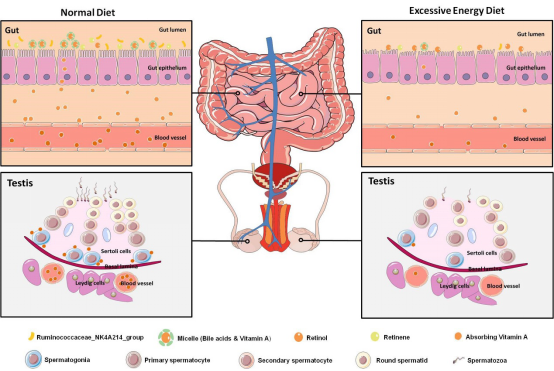The premise for the healthy reproduction and protection of germplasm resources of grassland livestock is the production of high-quality “seeds”-sperms and eggs. The excessive energy intake is a factor that increases risk for metabolic syndrome(MetS). MetS can induce not only chronicle diseases but also changes of micro-environment in testicle which will cause abnormal spermatogenesis. Besides, MetS can also induce gut microbiota dysbiosis. The recent studies indicate that gut microbiota dysbiosis is closely related to abnormal spermatogenesis. However, it is not clear how gut microbiota dysbiosis and abnormal spermatogenesis interact with each other.

On January 27, 2021, the Zhang Teng and ZhouYang-led research team which is with the Key State Laboratory of Reproductive Regulation and Breeding of Grassland Livestock of the School of Life Sciences of IMU publishes online the research article named “Disrupted spermatogenesis in a metabolic syndrome model: the role of vitamin A metabolism in the gut-testis axis” in the top international journal Gut with with IMU as the institution that the authors and correspondent authors are with. The team reports for the first time in the world that in the diet-induced metabolic syndrome sheep model, gut microbiota dysbiosis and reduction of bile acid level impact the transferring of fat-soluble vitamin A in gut-testis axis and inadequacy of vitamin A in testis causes impaired spermatogenesis.
The team induces MetS sheep model with excessive-energy diet and finds the disarray and loss of testicular cells in the seminiferous tubules of testis. In the analysis with 10X Genomics scRNA-seq in MetS model , it is found that spermatogonia(SPG) differentiation is blocked.
To further find out the reason, through using metabolomics profiling, it is discovered that the sharp reduction of bile acid levels of CA, LCA and TUDCA in the gut of sheep with MetS influences vitamin A absorption and the expression level of RBP4 is significantly decreased. As a result, vitamin A transported into testis is inadequate. Retinoic acid(RA)-derivative of vitamin A, is an indispensable extrinsic factor for germ cells to initiate meiosis. Therefore, vitamin A MetS is the key to blocking SPG differentiation.
Furthermore, through using 16S rDNA-seq, the team finds gut microbiota dysbiosis of MetS sheep model and relative reduction of abundance of Ruminococcaceae_NK4A214_group which are closely related to the level of bile acid and vitamin A. The conclusion is certified by transplant experiments, which fully manifests that gut microbiota dysbiosis leads to abnormal spermatogenesis via its influence on vitamin metabolism.

Zhang Teng and Zhou Yang, two research fellows who are talents attracted to IMU by “Steed Talent Plan”, are correspondent authors of the articles. Sun Peng, a PhD candidate, is the co-author of the research. The research is funded by National Natural Science Foundation of China, the opening project of the Key State Laboratory of Reproductive Regulation and Breeding of Grassland Livestock, the research initiating fund of IMU for “Steed Talent Plan” talents and research projects of Inner Mongolia Autonomous Region for high-level talents.
Linkage website of the article:https://gut.bmj.com/content/early/2021/01/26/gutjnl-2020-323347

